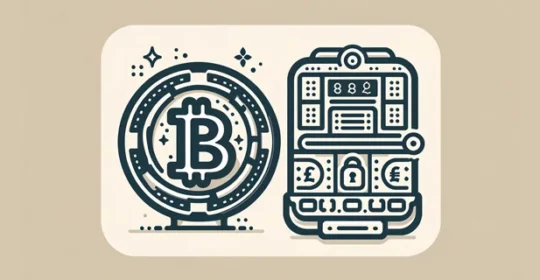No-ID casinos are rapidly gaining popularity due to their streamlined registration process and enhanced privacy for users. As more worldwide players seek anonymity and quicker access to gaming, these platforms are becoming a prominent choice in the online gambling industry.
But is it all plain sailing, and is gambling anonymously worth the payoff when it comes to giving up certain player protections and, even more so, the risk of not being able to retrieve potential large wins?
Table of contents
- No-ID casinos: what you need to know
- Benefits of No-ID casinos
- Drawbacks of No-ID casinos
- Considerations before playing at no-ID casinos
- Deposit and withdrawal methods that facilitate a no-ID casino
- Most likely methods
- Less likely methods
- Other considerations
- If you decide play at a no-ID casino but don't own any crypto
- Buying crypto on no-ID casinos
- Convenience vs. potential issues
- Alternatives to consider
- Are no-ID casinos generally licensed and regulated
- Licensed vs. unregulated
- Curaçao and others
- Truly unregulated
- Conclusion
No-ID casinos: what you need to know
No-ID casinos, also known as no-verification or KYC (Know Your Customer) casinos, are online gambling platforms that allow you to play without going through the usual identification checks. This means you wouldn’t typically need to provide documents like passports or utility bills to sign up and play.
Benefits of No-ID casinos
- Faster Registration: Signing up is quicker without the verification process.
- Privacy: Your personal information isn’t shared with the casino.
Drawbacks of No-ID casinos
- Limited Payment Methods: Often, they only accept cryptocurrencies like Bitcoin or Ethereum.
- Unregulated Casinos: These casinos might not be licensed and could be risky.
- Withdrawal Limitations: There might be restrictions on how much you can withdraw without verification.
Considerations before playing at no-ID casinos
- Security: Only play at reputable casinos with good reviews. Unlicensed casinos may not be secure or fair.
- Legality: Check the gambling laws in your region. No-ID casinos might not be legal everywhere.
- Responsible Gambling: Set limits and gamble responsibly, regardless of the casino type.
If you're considering playing at no-ID betting sites ( not available in 🇬🇧 ), prioritise safety and choose a well-established platform with positive user reviews.
Deposit and withdrawal methods that facilitate a no-ID casino
No-ID casinos, by their very nature, rely on payment methods that offer anonymity or minimal personal information exchange. Here’s what you can expect:
Most likely methods
- Cryptocurrencies: Cryptocurrencies like Bitcoin (BTC), Ethereum (ETH), and Litecoin (LTC) are the primary choices for no-ID casinos. Transactions are recorded on a public ledger (blockchain) but don’t necessarily link directly to your identity.
- Prepaid Vouchers: Some casinos might accept prepaid vouchers like Paysafecard or NeoSurf. These vouchers can be purchased with cash at retail locations, offering a layer of anonymity between you and the casino.
Less likely methods
- Credit/Debit Cards: Traditional card payments like Visa or Mastercard usually require verification due to banking regulations and fraud prevention. Whilst some no-ID casinos might bend these rules, it’s not a common option.
- E-wallets: Established e-wallets like PayPal or Skrill often require KYC verification for user accounts. Whilst some lesser-known e-wallets might allow anonymity, their trustworthiness on no-ID casinos can be questionable.
Other considerations
- Cash Transfers: Direct cash transfers between you and the casino are highly unlikely due to logistical challenges and money laundering concerns.
- Emerging Methods: New payment methods constantly emerge, and some no-ID casinos might explore those offering anonymity. However, proceed with caution with unfamiliar methods on these platforms.
Remember: Even with anonymous deposit methods, some no-ID casinos might have withdrawal limitations without verification. Always check the casino’s terms and conditions for details.
If you decide to play at a no-ID casino but don't own any crypto
Buying crypto on no-ID casinos
Don't have any cryptocurrency to gamble with? No problem! Some no-ID casinos cater to this scenario by offering built-in cryptocurrency exchanges. This means you can purchase crypto directly on their platform using a debit card, credit card (although less common due to verification requirements), or other accepted payment methods.
Convenience vs. potential issues
Whilst this functionality seems convenient, there are a couple of things to consider:
- Fees: These built-in exchanges might charge higher fees compared to dedicated cryptocurrency exchanges.
- Security: Whilst reputable no-ID casinos will prioritise security, it's always an extra layer to consider when your fiat currency interacts directly with the casino platform.
- Limited Selection: The cryptocurrencies available for purchase on the casino platform might be limited compared to dedicated exchanges.
Alternatives to consider
If you're concerned about fees or security, here are some alternatives:
- Buy Crypto on a Regular Exchange: Set up an account on a reputable cryptocurrency exchange like Coinbase or Binance. Once you've purchased crypto, transfer it to your no-ID casino wallet.
- Use a Prepaid Voucher: If the casino accepts prepaid vouchers like Paysafecard, this can be an anonymous way to indirectly fund your casino account without needing crypto beforehand.
Remember: Regardless of the method, always prioritise reputable platforms and be cautious with unfamiliar services, especially those directly integrated with no-ID casinos.
Are no-ID casinos generally licensed and regulated
Licensed vs. unregulated
Reputable gambling jurisdictions like the United Kingdom Gambling Commission (UKGC) or the Malta Gaming Authority (MGA) have strict KYC and AML (Anti-Money Laundering) regulations. No-ID casinos typically wouldn’t qualify for licenses from these authorities.
Curaçao and others
Some less-strict jurisdictions like Curaçao do offer online gambling licenses. However, these licenses might have looser KYC requirements, making them attractive to no-ID casinos. It’s important to note that a Curaçao license, whilst legitimate, might not offer the same level of player protection as licenses from stricter jurisdictions.
Truly unregulated
Many no-ID casinos operate entirely without a license. This is a risky proposition for you as a player. Unlicensed casinos have no oversight, and you have no guarantee of fair play or secure transactions.
Conclusion
Here’s the bottom line: If you prioritise security and fair play, licensed casinos with KYC requirements are generally the safer option. Whilst no-ID casinos offer some advantages, the lack of regulation and potential risks should be carefully considered.
Remember, gambling should always be fun and done responsibly. Choose your platforms wisely, stay informed, and enjoy the thrill of the game safely.





